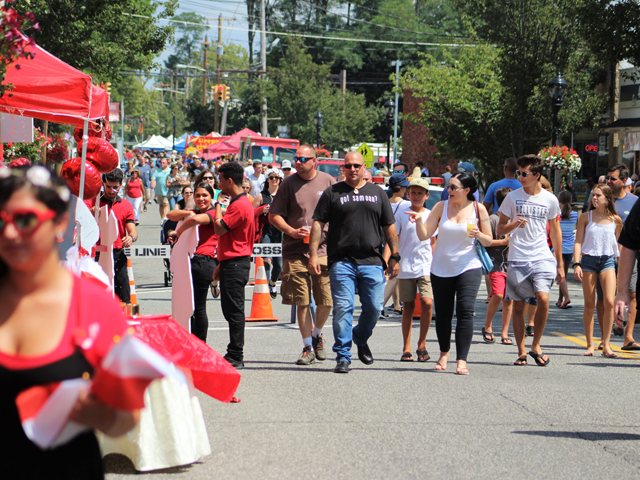Riverhead considering changes to special event code

Citing impacts on traffic and town resources, the Riverhead Town Board is considering a code change that would reshape how special event applications are handled.
During a work session Thursday, board members reviewed a record of special event permits issued over the last five years. Town Supervisor Laura Jens-Smith was struck by the number of events in August and upcoming in September.
“Every single weekend we have an event,” she said, looking at a September calendar, with several planned for the same day and another three events not included. “These are our big traffic times.”
She added that the proliferation of events could potentially add traffic to already crowded roads like Sound Avenue.
“It has a cumulative effect,” Ms. Jens-Smith said of special events, which require town resources to review applications and in most cases, an additional police presence.
Riverhead Town code defines special events as “any form of entertainment eight weeks duration or less, open to the public with or without an admission fee and held on a one-time or occasional basis, which may include but not be limited to, for example, carnivals, circuses, fairs, bazaars and outdoor shows, horse shows or exhibitions, concerts, road rallies and parades,” that draw more than 100 people.
Board members were also trying to deduce who has been paying special event fees and who has not.
“It’d probably be easier to list the ones that pay,” said Riverhead Town Police Chief David Hegermiller. Currently, nonprofit organizations do not pay any special event fees.
Some board members think that should change.
“Regardless of if you’ve been doing it forever or not, it’s still the town’s time and town’s employees,” Ms. Jens-Smith said. Councilman Tim Hubbard agreed that everyone should pay a fee, but proposed a reduced rate for nonprofits.
The supervisor proposed a $150 fee for local nonprofit organizations, $350 fee for short form events involving less than 1,000 spectators, $650 for long form applications involving over 1,000 attendees and $2,700 for events expected to draw over 5,000 people.
According to Chief Hegermiller, the report does not include parade permits issued, which currently have no fee.
“The Memorial Day parade, that’s a big event for me. A lot of manpower involved,” he said.
The current permit application requires that the applicant name what, if any, groups, organizations or charities will benefit from event proceeds and also states “if an applicant is requesting a special event permit that was held the previous year, verification must be submitted from those charities listed on the previous application.”
Ms. Jens-Smith said she would like to see that enforced.
“I think we should start saying that you cannot reschedule for the following year if you haven’t complied with that, because we haven’t been getting that,” she said. “You want to know that it’s going to charity and not all going to their administration fees.”
Councilwoman Jodi Giglio disagreed.
“I think we should strike that from the code,” she said. “I really don’t care where not-for-profits spend their money,” adding that reviewing their financial information would be taxing on town employees.
Limited town resources, especially in the fall, is a key issue for the board.
Ms. Jens-Smith suggested limiting event permits issued and extending the issuing period from the current 40-days to ensure better preparedness.
“It doesn’t give the town enough time to make these decisions,” she said, adding that 40 days out, many organizers are already advertising and promoting the event.
It could also help the town look at over-scheduling of events, which town attorney paralegal Laura Calamita pointed out is already codified. The town code states that if one or more events are scheduled for the same date that are within a half-mile radius of each other, the Town Board will determine if there are adequate resources for all these events, and can deny permits if the impacts cannot be mitigated.
Ms. Calamita also said that event organizers waiting for approval to serve food and alcohol can also slow things down.
With that in mind, the board agreed to potentially requiring applications six months in advance for events expected to draw over 1,000, 120 days for crowds between 750 and 1,000 people and any event requiring food and beverage permits. All other events with over 100 people would be 60 days.
Ms. Giglio thought the discussion was productive.
“I think we brought up some good points,” she said, adding that the code change should be drafted and brought back to a future work session. “Notification should go out to all the people that file chapter 90s on a regular basis to let them know about a public hearing,” she said, though a date has not been set.
Photo caption: The 2018 Polish Town Fair. (Credit: Elizabeth Wagner)









